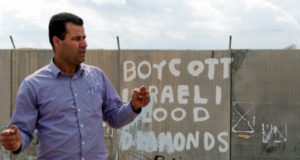By Akiva Eldar, published in Haaretz.
To view original article click here
The ultra-Orthodox settlement of Modi’in Illit in the West Bank should be granted city status despite suspicions that its council members were involved in authorizing illegal construction, an ad hoc committee set up by the Interior Ministry has recommended.
The committee’s decision contradicts expert opinions that severely criticized Modi’in Illit’s council for its involvement in approving the construction of Matityahu East, a new neighborhood that borders the Palestinian town of Bil’in.
Construction of Matityahu East was brought to a halt about two years ago after a petition filed by Peace Now and Bil’in residents to the High Court of Justice, claiming that the project lacked proper permits.
“[The petition] has exposed a serious phenomenon of building without plans or permits, or with permits issued devoid of a complete plan,” the High Court justices wrote.
During the committee’s hearings, the city council comptroller and Interior Ministry officials severely criticized Modi’in Illit’s council. A representative of the Israel Defense Forces, meanwhile, told the committee that the city was in a “state of lawlessness.”
One of the committee’s two members, however, is suspected of being in a conflict of interest. Committee member Zvi Cohen, the mayor of the nearby ultra-Orthodox town of Elad, recently told a local weekly newspaper that he has close ties to Rabbi Yitzhak Guterman, the mayor of Modi’in Illit.
“We have loose ties [to Guterman] due to a number of common interests that aren’t necessarily related to our geographic proximity,” Cohen told the paper.
Criticism of the construction of Matityahu East, which envisions 42 buildings containing around 1,500 apartments, began in September 2004.
Moshe Moskowitz of the Civil Administration, the highest authority for planning and construction in the West Bank, wrote to the Modi’in council comptroller that the council authorized the project even though it was beyond its jurisdiction.
“Construction authorization for the new project of Matityahu East was no doubt given against the instructions of the existing [master] plan and therefore was not within the licensing authority’s power,” Moskowitz wrote.
The petitioners’ attorney, Michael Sfard, who asked that construction be halted, said the planning authorities knew about the illegal circumstances and did nothing to stop the project.
“The takeover of the lands was carried out by a conspiracy involving private developers and Israeli authorities. Thus, criminal companies that stole private Palestinian lands won the protection of the fence – which was intended as a means of security and became a tool for annexation – as well as backing from the planning authorities, whose approval laundered the offenses,” Sfard wrote.
In the decision to legalize construction of the new neighborhood, the Supreme Planning Council for Judea and Samaria conceded that it had no master plan for Modi’in Illit, but cited an exception in Jordanian law – the basis for Israeli law in the West Bank – by which small communities do not require a master plan for the construction of new neighborhoods.
According to the Central Bureau of Statistics, Modi’in Illit had 33,200 residents as of September 2006.
 International Solidarity Movement Nonviolence. Justice. Freedom.
International Solidarity Movement Nonviolence. Justice. Freedom.


